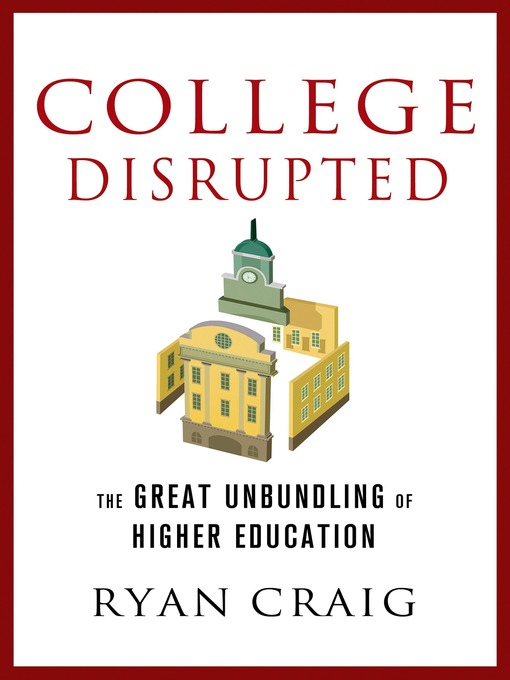
College Disrupted
The Great Unbundling of Higher Education
کتاب های مرتبط
- اطلاعات
- نقد و بررسی
- دیدگاه کاربران
نقد و بررسی

Starred review from January 26, 2015
Combining a flair for numbers with a grasp of the bigger picture, venture capitalist and educational entrepreneur Craig spells out the threats facing higher education in America, among them crises of affordability and governance, “the effects of technological disruption and globalization,” and “absolutely no outcome data related to student learning.” With sportive analogies to pop culture and his
own college pranks at Yale University, Craig outlines what institutions can do to position themselves for “the Great Unbundling,” in which students pay for education rather than for faculty research, fancy buildings, and college athletics. Craig’s strategic vision is strictly a business model, requiring institutions to compete for consumers, market their brand, and successfully
distribute their products worldwide, but his advice makes sound economic sense: to survive, he argues, institutions need to reprioritize “knowledge
creation and dissemination” and provide a good return on investment by
cultivating in students the cognitive, self-management, and “creative and
critical thinking skills that employers demand.” His suggestions, he admits, take “a ton work,” but his discussion of the existing data, federal policy, and market trends address “clear social economic needs.” Savvy, sharp, and ultimately optimistic, Craig’s book offers an ambitious blueprint that administrators would be wise to heed. Agent: Carole Mann, Carole Mann Agency.

December 15, 2014
A manifesto that analyzes higher education as another industry ripe for disruption. Craig's experience with public-private and online educational initiatives has given him a perspective that treats higher education as a market and students as customers. He's also plainly versed in pop culture (and a big Van Halen fan in particular; he seems to think David Lee Roth would be a great inspiration for university presidents), and he applies plenty of analogies and comparisons from that world to the subject at hand. Just as technology allowed music consumers to download the songs they wanted rather than the whole album, the subtitle here suggests that higher education is ready for a similar "unbundling"-that much of what goes into a degree, driving up costs and student loans, is of little interest to students or use to their future employers. "If higher education is to be unbundled, consumers need to be able to distinguish the education equivalent of the hit single from all the songs they don't want," writes the author, contending that "higher education will become more of a 'hits' business." It's hard to argue with the crisis that he documents: Costs continue to rise, student debt is out of control, and too many diplomas lead to jobs that don't require them. Yet some will find reductive the notion that outcome assessment of education can mainly be measured in jobs and that instilling competencies that employers most want should be the main purpose of a college education. Discussions of "competency management platforms that...will lead to the first human capital marketplaces" have little to do with the sort of enrichment that a liberal arts education once afforded. The author best serves as a gadfly, and his dismissal of the recently trendy massive open online courses as "the Spice Girls of higher education" is priceless. Even those who agree on the problems might take issue with the author's solutions.
COPYRIGHT(2014) Kirkus Reviews, ALL RIGHTS RESERVED.

January 1, 2015
Craig graduated from Yale University and Yale Law School and has become a successful entrepreneur focused on postsecondary education and technology. This book is a lively analysis of the strengths and serious challenges facing higher education and the potential of emerging technology to address the current crises of increased tuition costs, weak governance, and inadequate data. The author asserts that the academy needs to be restructured and unbundled by taking online teaching seriously in order to provide better accessibility, affordability, and efficacy. Without knowing precisely how this will evolve, he believes online competency-based education will serve students well at lower cost and link them with prospective employers. Craig presents exciting ideas about how new pedagogy and individually paced adaptive learning will satisfy students, but his concentration on getting the first job ignores higher education's complementary mission to develop students as critical thinkers and engaged citizens. The book's final chapters add perspectives on international trends and confused education policy in Washington but are only modestly related to the author's conclusion that his model will be a key resource in the near future. VERDICT A bright, anecdotal review of timely issues facing colleges and universities, though the author's conviction that technology incorporating fresh pedagogical methods can get better results is undermined by its one-sided emphasis on employability as the purpose of higher education.--Elizabeth Hayford, formerly with Associated Coll. of the Midwest, Evanston, IL
Copyright 2015 Library Journal, LLC Used with permission.

























دیدگاه کاربران